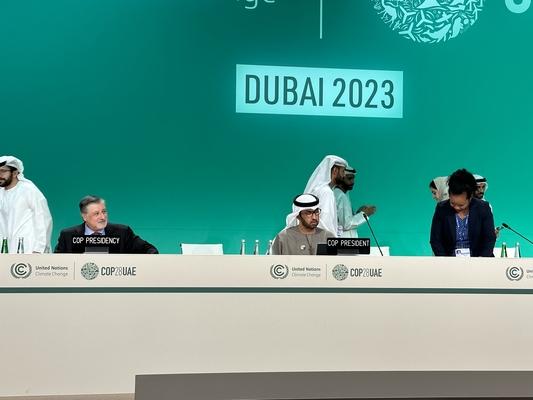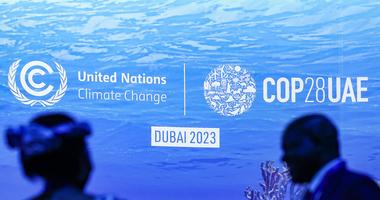
The World Changed at COP 28
5 min read
Having been defined by conflicts and contradictions from the outset –a UN climate summit held in a major petrostate and led by an oil CEO, for starters – it was only fitting that COP 28 should end the same way.
Consistently inconsistent to the last, the agreement COP 28 President Sultan Al Jaber gaveled through early in the morning of December 13 in one breath boldly calls on countries to speed the pace of climate action this decade and transition their power sectors away from fossil fuels.
Then in the next, the same text – known as the UAE Consensus – recognizes the role of natural gas in this transition and elevates unproven technologies the fossil fuel industry has used as license to keep burning and drilling for years to come.
Which is to say that the UAE Consensus will not itself change the world. But the message it sends and the COP that produced it ultimately just might.
Imperfect Progress
For two weeks of negotiations, the much-maligned Al Jaber told a story to delegates and the watching world. Over and over, he challenged delegates to deliver an agreement of the highest possible ambition. One that would keep the Paris Agreement goal of holding warming to 1.5 degrees within reach.
For the climate movement, the primary metric of success was clear: A global agreement to phase out all fossil fuels as quickly and fairly as possible. As former US Vice President Al Gore said, “There is only one measure of success for Cop28: will it include a commitment to phase out fossil fuels or not. If it does include such a commitment it will be a smashing success; if it does not it will be a failure.”
By both measures, COP 28 failed. The words "phase out" don't even appear in the final agreement text. Rather than highest ambition, the text itself prescribes what is in the face of the deepening and existential threat of climate change the barest minimum of response.
The truth is that for a movement powered by hope, COPs frequently disappoint, with Paris a notable exception. The consensus required from nearly 200 countries with vastly different goals, resources, and realities can easily translate into qualifications and half-steps when record-breaking heat and a cascading series of storms, fires, and more demand Olympic leaps forward.
But that doesn't mean COP 28 was a failure. Think of the COP process not as a quest for the breakthrough win, but more like a wind pushing nearly 200 clouds of varying wispy sizes to move in roughly the same direction. Each at their own pace.
While that might feel unsatisfying, that can still be vital progress. And that's what we saw at COP 28 in Dubai this year.
The End of Fossil Fuels Is Coming
A year ago at COP 27 in Sharm El-Sheikh, Egypt, petrostates like Saudi Arabia effectively shut down any direct mention of fossil fuels extending beyond the previous year's agreement to phase down "unabated" coal and "inefficient" subsidies.
This year, demands to not only address but phase out fossil fuels dominated talks inside negotiations, media coverage, and civil society discussion. A sign of just how much had changed was that early in the summit, over 100 countries called for a phase out of unabated fuels, the formal term for emissions not trapped by carbon capture, utilization and storage (CCUS) technologies.
Momentum continued to build throughout the summit, and it was a sign of the oil industry's panic that over the weekend leaked letters from the oil cartel OPEC revealed the body warning with "utmost urgency" that "pressure against fossil fuels may reach a tipping point with irreversible consequences" in current talks.
The same letters laid out the cartel's messaging strategy, urging members to "proactively reject any text or formula that targets energy i.e. fossil fuels rather than emissions."
What the cartel and nations like Russia and Saudi Arabia that also publicly rejected any talk of phaseout didn't seem to count on was the step change in public and negotiators' mood in the year since COP 27.
So much that when the COP president released a draft text with no mention of phase out or even the weaker phase down along with a litany of very fossil-friendly measures, there was a near open revolt led by many island states and vulnerable countries already suffering the worst of climate impacts.
As Jon Silk, head of the Marshall Islands delegation said, "We will not go silently to our watery graves."
What followed was a frantic series of negotiations with nearly 130 countries –including the US and EU as well as Norway, Australia, and Canada – calling for a phase out. As US Special Climate Envoy John Kerry told negotiators, "This is a war for survival," Anecdotal reports in civil society suggested countries would walk out, a major failure for the UAE hosts, without it.
Talks stretched far beyond the COP president's goal of a midday close on December 12. Initial text of an improved agreement was leaked and then denied as official by the UN.
Ultimately, the UAE Consensus that emerged provides the most direct recognition in a COP agreement yet of the role of fossil fuels in driving the climate crisis and a transition to renewables as a critical component of keeping 1.5 degrees in reach.
Following paragraphs recognizing both the massive gap between countries' pledges to act and actual steps to reduce emissions so far along with the limited time remaining to change course, the UAE Consensus calls on countries to take steps including tripling renewables and doubling energy efficiency this decade as well as:
"Transitioning away from fossil fuels in energy systems, in a just, orderly and equitable manner, accelerating action in this critical decade, so as to achieve net zero by 2050 in keeping with the science."
The Message Matters
The message both the COP 28 outcome and the extraordinary events that produced it send is clear: Absent a handful of petrostates, the world is ready to leave fossil fuels behind.
And yet, there are caveats. The first painful reality is that the agreement calls on countries to do so, rather than compels them through legal means or otherwise.
The second is that for every phrase above and elsewhere in the agreement propelling the world forward toward net zero, there are at least two giving petrostates and fossil fuel interests an escape hatch or even license to continue business as usual.
In particular, the text recognizes "transitional fuels" (aka, natural gas) in energy transition and a prominent role for CCUS right alongside renewables in the march to net zero. The elevation of CCUS poses particular danger as it effectively enables continued drilling and burning with no end date, relying on an expensive and unproven technology to capture associated emissions – a promise the technology so far shows no sign of delivering at the scale needed.
So how to understand the UAE Consensus? The mandate of this year's COP was to produce a stocktake with principles to shape countries' next series of climate commitments – known as nationally determined contributions (NDCs) – due in 2025. In theory, the agreement we saw in Dubai pushes these toward energy transition. Critically, the agreement also calls for a commitment to equity in this transition, with high-emitting wealthy nations moving first and faster, enabling developing nations more time.
Yet these come without any mechanism to enforce compliance. The challenge for civil society is to push countries to live up to this promise. Remember, nearly 130 countries showed support for phasing out fossil fuels in Dubai. Nothing prevents them from beginning this phaseout in the next year.
Perhaps the greatest win from COP 28 is a new sense of possibility. A belief that we can truly begin walking away from the fossil fuels threatening the planet we share.
Beliefs do not have the force of compulsory measures. But for the businesses, cities, and individuals who make the million investments, purchasing decisions, and other choices driving energy transition outside of negotiating chambers and in the real world, they may matter even more. And the message that came from COP 28 is the same as was broadcast on huge screens around the grounds: Transition is inevitable. If the future matters, our job now is to ensure it's fast enough – and fair enough – to make a difference.
To learn more about COP 28 and get a behind-the-scenes perspective, visit 24 Hours of Reality: On the Ground at COP 28.




